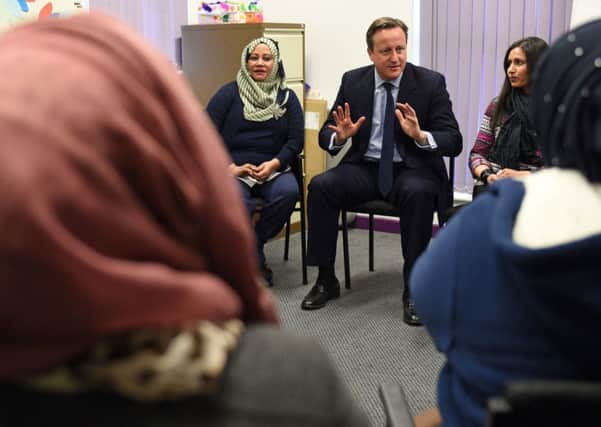YP Comment: Muslims must not be vilified


Contrary to perception, Asian families continue to make a positive, and substantial, contribution to the UK’s economy – and key services like the NHS. And, contrary to political wisdom, most recognise the importance of embracing this country’s language and customs – it would be remiss, at this juncture, not to acknowledge those Muslims who assisted with the clean-up operation following Yorkshire’s floods.
Yet, while the number of jihadists who pose a threat to the liberty of all represent a tiny fraction of Muslims who have successfully integrated into the British way of life, much more clearly needs to be done. As Mr Cameron made clear during his visit to Leeds, he believes that there are 190,000 Muslim women in the UK who speak little or no English and new arrivals will face the threat of deportation if they do not speak the language.
Advertisement
Hide AdAdvertisement
Hide AdHowever a number of questions remain unanswered. How will the language tests be undertaken? Will Ministers be prepared to use these new sanctions – or are they just empty words? And what about those Muslim women, longstanding UK citizens, who are prevented by their male-dominated households from integrating into society? As such, it is imperative that the Prime Minister retains the support of Muslim community leaders and scholars on these issues. After all, it is the imams, and especially those who have gone out of their way to champion British values and the rights of all, who hold the key to ensuring this well-intended policy has the desired effect and helps breakdown those cultural barriers which continue to exacerbate self-segregation in many of Yorkshire’s multi-faith towns and cities.
Where’s the steel?
THESE are desperate times for the last scraps of the UK’s once mighty steel industry with the latest raft of job losses – predominantly in South Wales – coming in the wake of the closure of Redcar’s historic steelworks and hundreds of staff being made redundant in Rotherham, Scunthorpe and elsewhere. Once again, this industry is paying the price for the steel market being flooded with cut-price imports from China and those EU-inspired carbon taxes which are undermining the financial viability of those plants that are still operational.
Yet there will be disappointment that Sajid Javid, the Business Secretary, has not persuaded the EU to see sense after promising to highlight this issue with the powers-that-be in Brussels following last October’s steel summit in Sheffield.
It is a failure which could have profound repercussions. Not only does it jeopardise the future of the UK steel industry which is said to be integral to the renewal of Britain’s railway infrastructure and so forth, but it will make it harder for David Cameron to convince sufficient voters that this country should remain a member of the European Union. For, by choosing to omit totemic issues like the future of manufacturing and those rules which have discouraged the dredging of flood-hit rivers and watercourses, it suggests that the PM’s demands do not go far enough. Both of these issues now fall into the “opportunity missed” category because of Mr Cameron’s inability to show sufficient steel.
Medical marvel
Advertisement
Hide AdAdvertisement
Hide AdHOLLY Drewry’s inspirational story not only exemplifies the very best of the NHS, but it also offers hope to all those people struck down with conditions like multiple sclerosis which preclude them from living happy and healthy lives.
Left wheelchair-bound by the debilitating condition, she’s now able to walk again – and lead an active life with her daughter Isla – thanks to pioneering treatment at Sheffield’s Royal Hallamshire Hospital which has the potential to provide a lifeline to some other MS sufferers following these successful trials which are a tribute to the ingenuity of the medical pioneers concerned.
It’s a powerful reminder, if one was needed, that the financial pressures bedevilling the National Health Service, both regionally and nationally, must not stand in the way of the way of research which has the potential to transform lives. To people like Holly and her family, no price can be placed on the importance of this work.